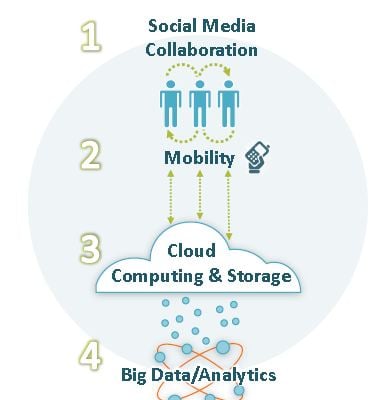Disruptive Technology Reshapes Outsourcing

Sourcing advisory firm ISG recently released its quarterly TPI Index that reviewed the  performance of the global BPO/ITO industry during Q4 2012. This review included a special look at four disruptive technologies ISG says impacted global outsourcing during Q4 2012 and will shape (and reshape) outsourcing in the long term – social media collaboration, mobility, cloud computing/storage, and Big Data/analytics.
performance of the global BPO/ITO industry during Q4 2012. This review included a special look at four disruptive technologies ISG says impacted global outsourcing during Q4 2012 and will shape (and reshape) outsourcing in the long term – social media collaboration, mobility, cloud computing/storage, and Big Data/analytics.
Everyone has their own informed opinion on how these four disruptive technologies are affecting and will continue to affect outsourcing, but I have been covering all of these topics fairly intensively in the past year or so for BPO Outcomes among other publications, and would like to share a few basic thoughts on each one.
Social Media Collaboration – Social media collaboration in outsourcing really takes two forms – collaborating with outsourcing providers and personnel and collaborating with customers/clients. In terms of collaborating with outsourcing providers and outsourced employees who may be working from distant locations, it is fairly easy to construct internal social media networks that allow instant communication across the globe and among all outsourcing participants. Internal social networks can also serve as stores of valuable information such as best practices, cultural issues, problem resolution procedures, etc.
In addition, companies can also enlist outsourcing providers to help them collaborate with their customers and clients through mainstream social media networks such as Facebook and Twitter or branded customer portals. Either way, outsourced social media experts can enable companies to quickly and effectively start interacting with customers through social media, taking advantage of the immediate, personal nature of social media to perform collaborative tasks such as conducting instant focus group surveys or collecting product design suggestions.
Mobility – Mobile technology allows companies to outsource potentially significant amounts of systems and functions without investing in significant infrastructure. While proper security technologies and procedures have to be implemented and followed, today’s mobile devices are capable of managing complex tasks and running sophisticated solutions, as well as of enabling secure access to vital data from virtually any point in the world.
Cloud Computing/Storage - As a result of increasing cloud commoditization, cloud computing users have been able to reduce the cost of operating IT systems while also increasing the flexibility of how and when those systems are used. This increased IT flexibility results in greater overall organizational agility, compounding the cost savings. Clouds are generally (but not always) hosted, lending them naturally to an outsourcing or managed services arrangement.
Big Data/Analytics – As increasingly complex and advanced processes and systems are outsourced, taking the outsourcing industry well beyond the early “lift and shift” days, a growing and potentially valuable trove of data is being generated. All the disruptive technologies listed above are creating volumes of data that did not exist a few short years ago, and insights that can help outsourcing buyers refine and improve their efforts are hidden within.
However, collecting, sifting and analyzing Big Data is a tedious and complicated process that involves data processing on a scale few companies can handle internally. But a whole new class of outsourcing specialists is emerging that focuses strictly on Big Data analysis, and the industry is already feeling the effects as more buyers are attempting to move into next generation outsourcing innovation.


